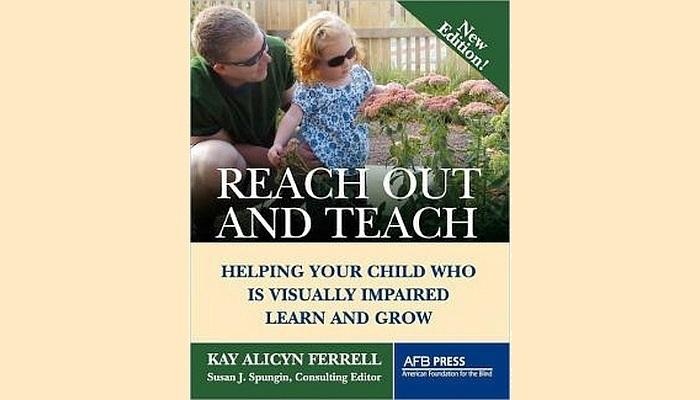Reach Out and Teach: Helping Your Child Who is Visually Impaired Learn and Grow

This post may contain affiliate links; please see our terms of use for details.
The empowering guide that taught parents how to promote the development of young children with visual and multiple impairments has been updated and is again available in print and even comes in a Kindle edition. Reach Out and Teach reflects the concerns of today’s families as well as the latest research on learning in infancy and early childhood. A must-have resource, Reach Out and Teach has been specially designed for families of children with visual impairment.
Reach Out and Teach includes new and expanded information on:
• The different learning needs of young children who are visually impaired
• Skills to focus on at different ages
• Effective ways of using everyday activities and routines to teach skills and encourage learning, with specific step-by-step suggestions
• Strategies for navigating early intervention services and the transition to elementary school
• Behaviors to promote in children with visual impairments for success in preschool and kindergarten
• Adaptations, assistive technology, and other tools that can help young children in the classroom
What I Learned when Reading Reach Out & Teach
I think the most important thing I learned from reading this book is how important it is to be an advocate for your blind child. This advocacy takes many forms. At first, you have to remember that your child is dependent on you to receive the services and resources that he needs. Even though the federal government provides laws that “guarantee” your child certain services, it’s much too easy for the state to overlook these laws, especially if you are unaware of them yourself. Through this book I learned, for example, that my son Ivan must be examined and evaluated by a test that is designed for visually impaired children and that this test must be administered and interpreted by someone with experience with visual impairment. Knowing what the law requires makes it much easier for me to ask our team to provide Ivan with all that he needs.
The second part of being an advocate for your child is to remember that most people have very little experience with visual impairment and that they may not know how to respond to or how to interact with your child. Through this book, I learned a lot about how blindness effects development and this has given me the terminology and tools to help other people understand why Ivan may do things a certain way or how it may be best to help Ivan understand something. The hard part is remembering to stand up for Ivan because, at least right now, he’s too young to do it himself. For example, when we go to the doctor’s office, I tell the doctor to talk to Ivan, tell him who he is, tell him what he’s about to do, let him feel the stethoscope before he uses it, etc. Even medical professionals forget that the little guy sitting in front of them can’t see.
Another important part of advocating for your blind child is reminding them how to interact with the sighted world around them. As Ivan matures, we need to remember that he can’t see what’s “normal” and what isn’t . He needs to have the opportunity to decide whether or not he wants to make “eye contact” or rock slightly while having a conversation with someone. I don’t want to punish Ivan for acting in a way that makes sense to him as a blind child, but I do want to let him know what’s “normal” so he can make that decision for himself. The Reach Out and Teach books emphasize over and over that blind children can’t see the difference between them and other children so you need to speak up and tell them. If you don’t, they’ll never know.
Finally, and maybe the most helpful, I learned how babies and children develop physically and how we can help Ivan move through different fine and gross motor milestones. Knowing the terminology and the order in which development is supposed to take place (for example, that babies need to be able to cross midline and twist before they can crawl) has helped me tremendously in discussing Ivan’s development with his physical therapist. It’s much easier to work with the therapist in planning Ivan’s goals now that I know which goals are most attainable right now and which goals should come first. This has made me a much more effective advocate for Ivan during our IFSP goal-setting meetings.
I highly recommend reading the Reach Out & Teach Book. This is a great place to start learning about how to teach a visually impaired child.
Related Posts

Eye Conditions and Syndromes, Visual Impairment
Neuralink Announces Plans to Restore Sight to the Blind with Brain Chip
Elon Musk’s company Neuralink has announced plans to begin human trials of its new “Blindsight” brain chip by the end of 2025.

Visual Impairment
The Gift of Understanding: How a Young Child Helps His Blind Father Navigate Life
When a parent is blind, it’s natural for people to wonder how their sighted child will adapt. Will they struggle to understand their parent’s needs? Will they feel burdened by...

Braille and Literacy, Toys, Visual Impairment
24 Braille Toys for Kids Who are Blind
Everything from alphabet blocks to raised line coloring pages and activity books to puzzles to card and board games... and so much more! And it's all in braille ready for...